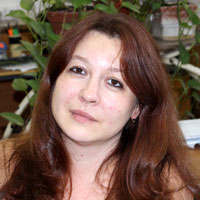
Lyudmila Mikheesku
A little while ago, I wrote a column about the characteristics of Korean dramas, talking about how bothered I am by product placement in TV shows. To be honest, though, there are some types of product placements that I don't mind at all: books. I find I always get hooked whenever a book gets the spotlight in a Korean drama.
The first book I read thanks to a TV drama was an illustrated storybook series called "Stormy Night" (가부와 메이 이야기), translated from the original Japanese into Korean. Featured in the 2013 SBS drama "Master's Sun" (주군의 태양), the book was used as a motif in the series, becoming central to the characters in the plot. At the time, I happened to be reading a lot of children's books in Korean as a way to improve my language skills. When I saw this book featured in my favorite drama, I jumped at the opportunity. A friend who was visiting Korea brought me back a copy as a favor. I read and fell in love with all six books in the series. Even though it's a children's book, it's beautifully written and has a complex storyline, just like a novel.
From that point on, I began to look forward to getting book recommendations from my TV shows. Once I started paying attention, I noticed that Korean books, as well as foreign books translated into Korean, were shown on TV quite often. I have yet to spot a Russian novel in a Korean drama, but other non-Korean books that are featured usually work very well with the story arc of the series. For example, Agatha Christie's mystery "And Then There Were None" was woven into the plot at one point in "Master's Sun." The book is based on the premise that 10 people, invited to a deserted island, die one-by-one over the course of the novel. When the main character in the TV show gets abducted as a teenager, the kidnapper forces the boy to read this book aloud, over and over again. The boy, realizing the morbid ending to the novel, becomes terrified, believing that he, too, will get killed. The scene was quite dark, but the Agatha Christie novel worked well in this particular episode.
Some dramas also make use of the classics. The 2013 KBS TV show "Secret Love" introduced Emily Bronte's "Wuthering Heights" into its plot, to bring in themes like love and revenge.
TV drama producers don't get it right all the time, though. In "Producer," which aired in 2015 on KBS, one of the characters who plays a famous pop star, suddenly falls deep into Hermann Hesse's "Demian: The Story of Emil Sinclair's Youth." This is a great book, but I don't think it suited the character. It was quite humorous, actually.
These days I've been watching tvN's "Guardian: The Lonely and Great God." A few weeks back, the series introduced a poetry book called "May the Stars Carry Your Sadness Away," a selection of poems by Korean and non-Korean poets. The drama references this book throughout the series, but I particularly fell in love with a poem titled "The Physics of Love" by Kim In Yuk, and hope to read more works by this poet. It's true that poetry is one of the hardest genres to attempt as a non-native speaker, but I've decided to give it a shot.
The title of this column may suggest that I only watch Korean dramas to find good books. That's not entirely true. Over the years, I've also discovered countless other things, like clothes, shoes and cosmetics, in addition to books. I especially look forward to the books, though, and hope that I will stumble upon more interesting titles in the dramas I enjoy.
Lyudmila Mikheesku is a photo editor at the Russian media company Nezavisimaya Gazeta.
Translated by Lee Hana, Korea.net Staff Writer.
